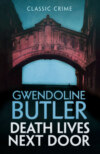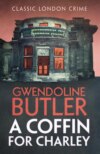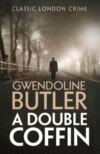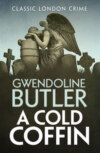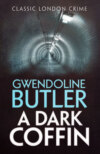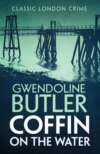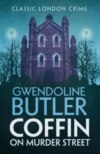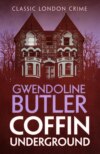Читать книгу: «Coffin and the Paper Man»
GWENDOLINE BUTLER
Coffin and the Paper Man

Contents
Cover
Title Page
Chapter 1
Chapter 2
Chapter 3
Chapter 4
Chapter 5
Chapter 6
Chapter 7
Chapter 8
Chapter 9
Chapter 10
Chapter 11
Chapter 12
Chapter 13
Chapter 14
Chapter 15
Chapter 16
Chapter 17
Keep Reading
About the Author
Also by the Author
Copyright
About the Publisher
CHAPTER ONE
The Day of May 25 and on to May 27
GRIM. GRIM. the word was going out over the police airwaves at Nineteen hundred hours precisely on this day, May 27, 1989.
GRIM. GRIM. Rope Alley, Leathergate.
This was the code word in the police district under the command of John Coffin (thought intellectual and elusive by his new Force, where his code name was WALKER, but never judged arrogant or uncaring), for what they were beginning to call gender murders.
Gender murder: the killing of a woman in circumstances of a sexual assault. GM. Because the word rape came up, the letter R got itself into the code.
The code was beginning to creep into use all over the many areas and peoples that make up modern London. The two Londons, the many Londons.
London is a collection of villages. They stretch out on either side of the river into the flat lands of Essex, and up towards the hills of Kent.
Some are very old with their names in the Domesday Book and even earlier records. Such are Wapping and Billingsgate and Greenwich. Under other names, the Romans probably knew them too and cursed them for being barbaric and remote from the warmth and comforts of their home town. Some, like Mayfair, are relatively new. New as these things go, owing their existence to the shift of fashion westwards from the old city clustered around the Tower. Interestingly, the centres of crime have shifted westward with the centuries, keeping in touch with fashion.
Most of the villages are happy ones, but some are happier than others and one or two are unhappy. For various reasons.
The old village of Leathergate was very unhappy at the moment. It had known some rough times in the past, when murder and violent death had been almost a home industry, but the present days were uneasy, with the new rich in their smart new apartments irritating the old poor, while the new poor, some of whom had known better days, were even crosser. A mini war of the classes was brewing up in Leathergate.
Leathergate was part of the new Second City of London whose policing was in the hands of the new Force directed by John Coffin, Chief Commander. Together with Spinnergate, and Swinehouse and Easthythe and other old villages both south and east, it was a whole new urban concept. Old in history but with a new Royal Charter and lots of hopes.
In Leathergate that May 25, a girl lay dying in an alley.
She had been beaten and raped, and then a knife had penetrated her ribs, cutting through to her lungs. She did not die at once.
She was still alive when a boy with his dog discovered her, still alive as the ambulance arrived.
She spoke to the ambulance men.
‘Get the man who killed me,’ she whispered.
The ambulance driver, a senior man, turned to his junior. ‘Lift her up carefully, she’s going to go.’
They were always careful, it was his emotion that spoke. He knew the girl.
At that moment, she died.
Anna Mary Kinver was sixteen years old, looking eighteen. She had long fine blonde hair which was tangled and bloody in the mud. The same mixture, red and black, spread over her check mini skirt and white shirt. It was the day before her birthday when she had a party planned at a local disco and in the alley beside her was her new party dress for next day and a pair of silver slippers, one of which was missing.
Poor little Cinderella who would never get to the ball. Rope Alley ran between the old Clover Rope Works, now converted into smart apartments, and the former Lead Works, now an art gallery. It is as well to get the geography right in this complicated district with its palimpsest of history.
The narrow path between the two high buildings was the way home between the shops in the North Ferry Road and Elder Street.
Anna Mary Kinver, one of the new poor, descended from a long line of the old poor, had lived with her father, new poor/old poor nicely mixed up, in a house in Elder Street. He was there now, waiting for her to come home. She was never going to come.
A policewoman knocked on the door of No. 13. She too had known Anna Mary Kinver, having been in the top class of the large comprehensive when Anna Mary had arrived, a skinny eleven-year-old, to be educated into believing that there was a rich world outside into which, if she learnt French, German, mathematics and how to use a computer, she could be inserted. Thus she was rich, then poor, almost at once afterwards.
Still rich in hope and expectations on the day she died, but poor in any practical delivery of what she wanted, and only able to afford a pair of silver slippers from Mr Azzopardi’s Bazaar rather than from Maud Frizon in Bond Street. She knew about Maud Frizon though, and had stared in the window at her pretty shoes.
The policewoman hated the task she had been given. It was monstrous, horrible, and sad. But it was her job and she was going to do it.
She did not mention death as she first spoke to Fred Kinver, she just spoke of a bad accident and the hospital. She would get round to the rest of the message as she drove him to where he must go.
If he hadn’t guessed. People did guess.
The exact circumstances of Anna’s death had been passed on to the WPC by her sergeant, but these she would not transmit. He’d find out soon enough.
She meditated for a moment on the fact that he would have to identify the body. Oh dear. Fred Kinver was not going to be able to bear doing that, but he would have to. He had the look of one of those who would turn aside from a dead rabbit. She was not unlike that herself, but after several professional visits to the police mortuary she had learnt the knack of not seeing more than you must.
Of course, for him that would be difficult.
Fred Kinver sat beside her in the police car, having a pretty shrewd idea of what lay before him. He had that sick feeling in the pit of his stomach that assured him that the worst had happened.
‘The wife’s out,’ he said. ‘Hasn’t got back from her work. She has an evening job. I shall have to tell her later.’
‘We’ll do that for you, Mr Kinver.’
‘Better do it myself.’
We’ll see, thought the WPC. See how you feel.
Fred Kinver had worked in the biscuit factory in Deen Street till it moved to Slough, somehow managing to let Mr Kinver float away from it. Then he had worked in a small bakery until that was swallowed up by a supermarket. He had gone free from that too, although several other employees had been taken on. To encourage the fresh-bread-baking smell over the wrapped bread counter, the cynics said. Since then he had done odd jobs around the new local theatre, the Theatre Workshop founded by Mrs Lætitia Bingham, where his wife worked for one of the actresses as dresser cum handywoman.
Anna Mary had been studying computer programming at the local Sixth Form College with a grant from the City firm which had promised her a job on completion. The grant was a good one, more than her father earned in a year, so that he called her one of the rich. But the Crash of ‘87 with the doldrums that followed had obliged the firm to declare redundancies. Anna Mary lost her grant and her offer of a job. So she was one of the new poor before truly she had ever been one of the new rich, it had all been hopes and dreams. But at her age, she said, it didn’t matter, and she loved dancing at discos where she had any number of friends.
WPC Flo Rusher, Flurry to her friends, drove carefully towards the newly built police headquarters, taking back streets like Pavlov Street and Down Road and Peterloo Circus, to avoid the traffic. Nice area, she thought, live around here if I could.
‘Nearly there.’
‘Remember what this was like in the old days?’ asked Fred Kinver as if it mattered to him.
‘Not really.’ She swerved expertly round an illegally parked Porsche. She knew Mr Kinver although he didn’t seem to know her. Broken Biscuits, they’d called him. Anna Mary had always had a bag of broken biscuits in her pocket.
‘Slums. Packed little houses. Full of people and mice. But friendly. Look at it now. Too bloody rich to speak to the world.’
She looked at his thin hands twisting restlessly in his lap. This is going to be one of the really bad ones, she thought.
Fred Kinver suddenly sat up alertly. ‘Wait a minute, this isn’t the way to the hospital.’
How to tell him that his daughter had died as the ambulance men touched her, and would therefore have been DOA and hence not taken to the hospital but to the police mortuary? Or for all Flurry knew, she might still be in situ in Rope Walk, being measured and photographed.
‘Not just at the moment, Mr Kinver,’ she said soothingly. ‘Our DI wants a word with you first.’
Suddenly aware of what lay ahead of him, Fred Kinver began to scream.
In one of his rare moments of leisure, John Coffin had speculated that the so-called Second City of London together with his new Force had been invented to annoy him. His patch was ripe with murders and crimes of violence, rich in sophisticated villainy. Had been for centuries, they had nothing to learn.
Two days after the murder of Anna Mary, on May 27, in the course of one of his unscheduled and unannounced forays of inspection around his new headquarters he had seen the report on Anna Mary.
Not one of our better jobs, he thought, but routine for round here. The thought did not cheer him up. He had gone through a lot since he took up his new command. Too much, perhaps.
To his surprise, however, he had no more grey hairs and was no thinner now than two years ago when he had been appointed. Perhaps his expression was more cautious.
‘You look so canny these days, John,’ his half-sister Letty Bingham had said only that morning, Saturday, May 27. She had called from New York where she was visiting her husband. Or so Coffin supposed; his name was never mentioned and possibly had long since been banished. It was not a subject he was going to raise with his sister, especially on the telephone, where he was always frugal. But time and distance made no difference to Letty when telephoning, she would call as readily from the States as from across London and talk as long in the small hours as at noon.
‘That’s because I’m always watching my rear.’
‘As good soldiers do. And you’re a good soldier, John.’
‘Think so? And a good politician too, I hope, because I have to be that as well.’
They shared the same mother but had different fathers and had experienced vastly different upbringings. Letty, offspring of a GI father, had been educated in English schools and an American university. She was a lawyer, and had been married twice. Coffin wondered about the state of this second marriage to a property magnate of some wealth, but, granted they never seem to be in the same continent together, it seemed to be holding.
Letty had a daughter, and both of them shared another half-brother called William who was a Writer to the Signet in Edinburgh.
After years of thinking himself alone in the world, Coffin now found himself with respectable family connections. And remarkably, as he had pointed out, they all seemed attracted to the law in one way and another, so there had to be something in ancestry after all.
Their elusive mother who had bred them all, choosing her mates eclectically, was dead, but her presence lingered on in the shape of some amazing diaries that Letty Bingham declared should be published.
Over my dead body, Coffin thought. A certain theatrical-ism hung over Mother’s memoirs and this quality had rubbed off on Letty (possibly all lawyers had it), who was now engaged in turning a piece of property, an old church owned by her husband in the New City, into a theatre and a theatre workshop.
The workshop was in operation, the theatre was still on the planning board, but the luxury flats which were meant to help pay the way of the theatre were complete and occupied.
John Coffin lived in one, and although he had flinched at the cost of his apartment in the tower of old St Luke’s Church, he now enjoyed living there very much. He liked looking down from his high window on the world below where he must keep the Queen’s Peace.
There were two other tenants, one of whom, the actress Stella Pinero, he knew very well, and the other, recently moved in, he had not yet met. A man, so he was told. An art dealer, rumour had it, who had bought the Lead Works Art Gallery. Or was it his friend who had bought the flat, Sir Harry Beauchamp? Rumour and invention were still working on the story.
Letty had made money on all that enterprise, but she was now much preoccupied with creating her theatre, which was why she had telephoned.
‘I want to call it the Ellen Terry. What do you think of that? We must get the name settled soon because of the publicity.’ Letty always thought about the publicity, good or bad. Any was better than none, she believed.
‘Have you asked Stella? She usually has good ideas.’
‘I think Stella is more worried about the lavatories at the moment,’ said Letty tartly. ‘She’s always so practical.’
Stella Pinero, that distinguished actress, had accepted the appointment as resident director of the Theatre Workshop, with the implied assumption that she would continue with the main theatre when built. Times away for other work in TV and films and the other companies had been carefully negotiated, and she had just finished a six months’ stint on the West End stage in a long-running comedy and was back to appear in the Workshop Theatre, richer and ready for a change.
‘I’ve got to live,’ she had pointed out to Letty, ‘and what you pay wouldn’t keep a cat alive.’ She had a cat, as it happened, or a half share, as Tiddles lived part-time with John Coffin.
‘I thought it was security that worried her.’ Letty Bingham’s enterprise in converting the disused St Luke’s Church into several luxury apartments, together with a Theatre Workshop and the planned main theatre, was popular in the district as bringing lustre on the neighbourhood, but lately a certain Them and Us attitude had marred the good will.
Stella had not liked having GO HOME YUPPIE painted all over her posters for her last production, The Birthday Party, and a load of rubbish deposited outside the stage door. Nor having one of her cast beaten up on his way home.
‘That too, but she feels happier now she’s got Bovvy End on her team as assistant director; he’s so huge she feels he ought to be able to protect them against most things.’
Though you can’t be protected against everything, thought Coffin, his mind going back to the latest murder in Leathergate.
‘Anyway, I am flying back tonight,’ said Letty. ‘That’s why I am telephoning. How are you getting on with Mother?’
‘I’ve read most of her production. Her handwriting is terrible, though. Slows me down.’
‘I suppose she did mean it as truth? Has it occurred to you it might be a work of fiction?’
‘I think she was a bit of a liar, our mother, if that’s what you mean.’
A liar and an escape artist as well: she had produced three children by three separate fathers and managed to abandon them all.
‘There’s a very interesting murder going on here,’ ended Letty conversationally. ‘A girl’s head in a bathtub, and bits of her turning up everywhere. They’re looking for her feet now. I declare I’ll be glad to be back in London.’
We have our murders too, thought Coffin, as Letty’s presence (he could nearly always see Letty when they spoke, she seemed able to project herself visually) in his room melted back across the Atlantic. And I’m looking for a shoe.
Since he had to speak to DI Young on other business (they were both on a committee setting up an under-fifteen football club in the old Brush Lane ground down by Beowulf Dock), he was able to ask: ‘And have you found the other silver shoe?’
‘Not as yet. But we will.’ DI Young sounded confident. As he always did. He had decided early on in his career that this was the right way to appear and so far had seen no reason to change his attitude. At home was different: his wife was smarter than he was, better educated and was climbing up the career ladder (she too was a police officer) faster than he was. At home he was more cautious.
Coffin nodded. ‘Let me know. I’ll be interested.’
‘Right, sir.’ Cheerful as ever, Archie Young had added: ‘We’ll soon have the whole thing wound up. Several interesting leads. A witness who saw a man near her. A woman who heard her call out. Didn’t do anything, of course, but heard her. That gives us time. And then there’s what she said herself.’
Get the man who killed me.
Yes, that was interesting. But how did it help?
‘We know it was a man, anyway,’ he said to Young.
‘It means she didn’t know him.’
He was pleased with himself. Got the old man there, he thought.
But John Coffin, as he put the receiver down, picked up his briefcase, and patted the cat, thought: I wonder. I wouldn’t count on anything. Long experience had taught him, what was it, canniness?
Archie Young was sharp enough to pick up the implications of his boss’s voice. ‘I have the names of her friends from A to Z,’ he said to the well-filtered air of his office.
Behind the big new police station which was the Force Headquarters and which had been designed by a neo-modernist architect so that it looked like a Venetian Gothic castle in red brick (but was bullet-proof and fireproofed and so air-conditioned that not one natural breath could be drawn in it) was what had once been the choicest area of Leathergate in which to live. The street where the few professionals like the doctor and the solicitor and the undertaker had made their homes. It was still a nice district and a few of the old families clung on.
Feather Street curved down a gentle slope and up the other side until it looked down on the railway embankment, solid Victorian houses with large gardens which backed on to each other so that cats, dogs and even humans could pass freely between them. At the bottom of the hill were a few shops such as a dairy, and a baker’s and a shop renting videos out.
Here still lived Dr Leonard Zeman, his wife Felicity, who was a pediatrician, and his son Tim, who was an architectural student at the Poly. Across the way was the house of his widowed mother and her unmarried niece. The Zeman houses were No.5 and No.22 respectively. Felicity had a white pekinese dog and her mother-in-law had a mongrel called Bob.
The Annecks were the owners of No. 10 and the Darbyshires lived in No. 13. They had Jack Russell terriers, brother and sister, who hated the sight of each other, fought whenever they could and had to be exercised separately at different hours. The families had worked out a rota of dog departures and entrances and a bell was rung before setting out to make sure the enemies did not meet. They were suspected of having killed a cat apiece. These were the families that knew each other best in Feather Street. Mrs Anneck was a local councillor, Harold Darbyshire worked in the Bank, and everyone knew Dr Zeman.
They were all very busy people, fond of their animals but not good at exercising them, so they were walked accordingly to a strict timetable by Jim Marsh, the son of the milkman (C. Marsh, Daily Deliveries, who had not always been a milkman but had been into Flower Power and Love is All and being a Free Soul, only a man must live), who was hoping to be a vet. He was a kind of professional dogwalker, and, as a matter of fact, it was he who had found Anna Mary’s body. With him at that time was the better behaved of the Jack Russells, but even so he had had to pull back the dog from licking at the blood on the pavement.
The dog-walker was a quiet, thin boy, over eighteen but looking younger, who loved the dogs, but even he found this hard to bear. When he got home, he was sick in the kitchen sink before preparing a meal for his father. His mother was dead.
The policeman who had brought him home had been kind but not really understanding. The ride in the police car had been interesting, although not enjoyed by the dog he was walking.
‘You know, Mum,’ he said—he still spoke to his mother sometimes, although she had been dead some months now, and she seemed to pay more attention than she had in the past. ‘It was bad. Bad.’
He too had heard the words that Anna Mary had spoken.
Coffin, having completed his call to Archie Young, prepared to depart for yet another committee meeting, this time one he would chair. He was a desk man these days, and the novelty had worn off with only the boredom remaining. But he was learning how to turn the boredom to his advantage; he could convert it into a kind of anger, and spread it round the committee so that they all shared the desire to get on with the matter in hand speedily. If you enjoy a committee meeting, was his dictum, you are doing it wrong.
He walked down his winding staircase in what had once been the bell-tower of St Luke’s, wondering if his car, left parked overnight in the street, would or would not be vandalized. Last week, some hand, which had in his opinion to be masculine and under fifteen, possibly half of that, had scratched on it several phallic symbols. They might have been cacti or bananas but he thought not.
He could hear voices from the hall where his entrance adjoined that of Stella Pinero in St Luke’s Mansions.
A light silvery voice was saying: ‘They didn’t worry about where the lavatories were in the Globe.’
Stella Pinero could be heard loud and clear, her voice rarely failed to hit its mark: ‘I don’t think they had lavatories in the Globe: they just used the back wall.’
They were standing in the hall, Stella in brown trousers and a cream shirt with a blue scarf tied round her hair. With her was what could only be their new neighbour: a tall, grey-haired man in a suede jacket as pale as his hair. He too wore a blue scarf, but his was knotted round his neck over his matching shirt. He looked distinguished. Was distinguished, since Coffin recognized him as a famous photographer.
Stella turned round.
‘Oh, you’ve got Tiddles.’
‘Have I?’ He looked. He had. Tiddles had come down the stairs behind him, and was now discreetly emptying himself out of the room in the way cats have.
‘You know Sir Harry, don’t you?’
‘By reputation.’ He held out his hand. Harry Beauchamp, recently knighted, was famous for his photographic portraits and revealing group and street scenes. He had an eye. Younger than Cecil Beaton and older than Snowdon, he looked set to beat them all.
‘And I know you,’ said Sir Harry, giving him a tight, hard shake. ‘Saw you in court when Edith Martiner came up for trial. She did it, of course.’
‘Oh yes. She was lucky to get off.’
‘I was doing a series of photos of different types of women. She was a type all right. Wouldn’t have liked to be shut up in a room with her. Thought she’d eat me as it was. Wonder what’s happened to her.’
Coffin, who knew, said nothing.
‘I heard she went to Tibet, beat up a soldier and got shot.’
It was not quite the story Coffin knew, but it might have been truer than the version he had. There were so many ways of telling the truth.
‘I’d be surprised if she’s dead … I thought you were our new neighbour,’ he said.
‘Dick? I’m going to share with him. You’re getting us both.’
Over his head, although tall Sir Harry was shorter than she was, he met Stella’s amused, informed smile. Always do, always have, her lips breathed: a twosome.
‘Sir Harry’s going to do some photographs of our Work in Progress. One of the Sunday supplements is taking it. Lovely publicity for us.’
‘Take some of you, if you like,’ offered Sir Harry. ‘Got any good crimes going? I like a bit of background material.’
There was a screech of brakes and an angry shout from outside.
‘That’s Tiddles crossing the road against the lights,’ said Stella with resignation. ‘He will do it.’
As Coffin got in his car, he saw a middle-aged man and woman standing on the pavement. He knew the woman’s face, he thought she worked in the theatre for Stella. He thought they were studying him, but he did not hear what they said.
‘Is that him?’ asked the man.
‘Yes. He’s late to work today. Very punctual as a rule.’
‘He looks that sort.’
‘You won’t—’ she hesitated‘—do anything, will you, Fred?’
‘No. I just wanted to see him. Get to know his face.’
‘How can that help, Fred? How can it help Anny?’
‘It helps me,’ said Fred Kinver. He strode forward, feet heavy and fast on the ground, he had always been a mover, played football in his youth in the days when there were such things as wingers and a man had to be able to run. She had a job keeping up with him.
‘Walk on,’ he commanded.
‘They’re doing what they can, Fred.’
‘Doesn’t it matter to you that the police haven’t got the man that killed your daughter yet? It matters to me. I screamed when they told me.’
‘I heard you,’ said Mrs Kinver. ‘You kept it up.’
‘You just sat there quiet.’
‘Everyone grieves differently.’
‘I’m not grieving. Not just grieving. I’m working at it. That’s why I wanted to see his face. You can get at that one. Get through to him. I feel better now I’ve seen that. I shan’t let him alone.’
‘Walk on.’
They walked on. Beyond St Luke’s Mansions where Coffin lived and the theatre was rising, past the new police building, down the slope of Feather Street where the Zemans and the Annecks and the Darbyshires lived and where the small dairy, home to Jim Marsh and his father, clung to the bottom of the slope.
Бесплатный фрагмент закончился.
Начислим
+4
Покупайте книги и получайте бонусы в Литрес, Читай-городе и Буквоеде.
Участвовать в бонусной программе











